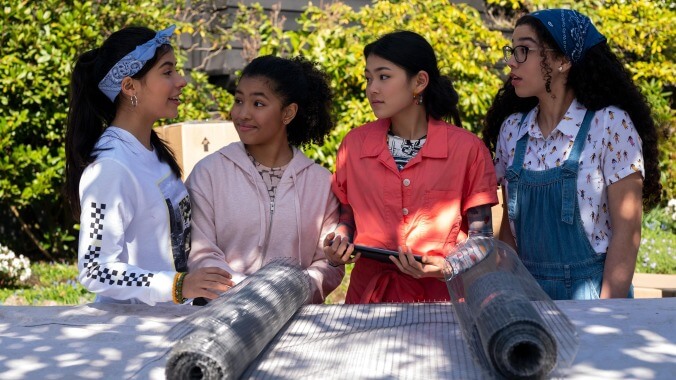The Baby-Sitters Club is just as pure and charming in season 2
Based on Ann. M Martin’s book series, Rachel Shukert’s Netflix dramedy is a joyful escape

In its second season, Netflix’s The Baby-Sitters Club continues to be a sunny gift. Created by Rachel Shukert, the coming-of-age series captures the spirited teens of Ann M. Martin’s popular books with incredible nuance. The eight new half-hour episodes deepen the characters’ identities and friendships, making for an enlivening watch. It’s the kind of joyful escape the world could use right now.
The show’s sitcom-like structure—which sees almost all conflicts in an episode get resolved—makes it a bit formulaic, but never monotonous, thanks to vivid narration from each protagonist. There’s comfort in knowing a happy ending is around the corner. Through its talented group of middle-schoolers, The Baby-Sitters Club tackles serious matters, from fear of abandonment to dealing with grief to peer and parental pressures. These issues are taken care of deftly and emotionally, without steering away from the show’s or the books’ innate lightheartedness. It helps that Martin is a producer and writer on the series.
The second season gives sufficient time in the spotlight to every young actor, of which there are now quite a few. Captained by Kristy Thomas (Sophie Grace), the babysitting club she founded has become a full-on success, and has two more full-time teammates: ballet dancer Jessi Ramsay (Anais Lee) and hyper-enthusiastic Mallory Pike (Vivian Watson). As business booms, the eighth-graders solidify their friendship with sleepovers, birthday parties, and heart-to-hearts in secret passageways.
Mallory is often polarizing on the page, but here she is portrayed with tenderness, as is the rest of the crew. The core cast shares such brilliant chemistry, their interactions in ensemble scenes always flow naturally. And the series continues to offer a realistic portrayal of teen girls’ interactions and day-to-day challenges with school, boys, and their families.
The book series is nearly four decades old, but the show is clearly contemporary, as evidenced by references to social media influencers, unboxing videos, and a shoutout to March For Our Lives. But the nostalgia for the ’90s is discernible through the pastel overtones, Claudia Kishi’s (Momona Tamada) stylish jean jackets with sewn-on patches, and classic bizarre settings like the town’s Baby Parade (as adapted from the novel) or having these middle-school kids be part of a fashion show gala for charity.
The seemingly heightened situations are balanced with grounded storylines, like Kristy and her mother Elizabeth (Alicia Silverstone) adjusting to life in a rich neighborhood, Mary-Anne Spier’s (Malia Baker) relationship drama, or Stacey McGill (Shay Rudolph) confronting her anxiety over her diabetes.
The Baby-Sitters Club remains enjoyable as it challenges the protagonists’ notions of themselves or of their friends. Dawn Schafer (Kyndra Sanchez, replacing Xochitl Gomez) and Mary-Anne became fast buddies in season one. They hope to become siblings now that Dawn’s outgoing mother is dating Mary-Anne’s introverted father. One of the sophomore run’s episodes tests their relationship and provides breakthrough realizations about their individual personalities.
The soulful fourth episode, “Jessi And The Superbrat,” introduces Jessi’s parents as well. Their arrival makes room for the show to represent a supportive Black family as it examines Jessi’s relationship with her mother, who tends to push Jessi out of her comfort zone for good reasons. The outings from Claudia’s point-of-view are also heartening. Much like season one, they explore aspects of her Japanese heritage when she’s with her beloved grandmother, Mimi (Takayo Fischer). While Claudia has trouble training Mallory and shrugging off labels placed upon her, the turmoil with her family that she displays in episode seven, “Claudia And The Sad Goodbye,” cements Tamada as a star in the making.
The Baby-Sitters Club ultimately thrives as feel-good entertainment, and its timing couldn’t be better. The last several months have proven that the demand for sappy, hopeful content is on the rise. The Baby-Sitters Club provides exactly that for multiple generations—it captures an old-school family TV vibe, but the comedy is relatively subtle. There are no over-the-top jokes or irksome laugh tracks, just a gentle approach to resolving conflicts. The series works for viewers who grew up reading Martin’s books just as well as it does for those who aren’t well-versed with the original material—emphasizing the power of female friendships at a pivotal age.